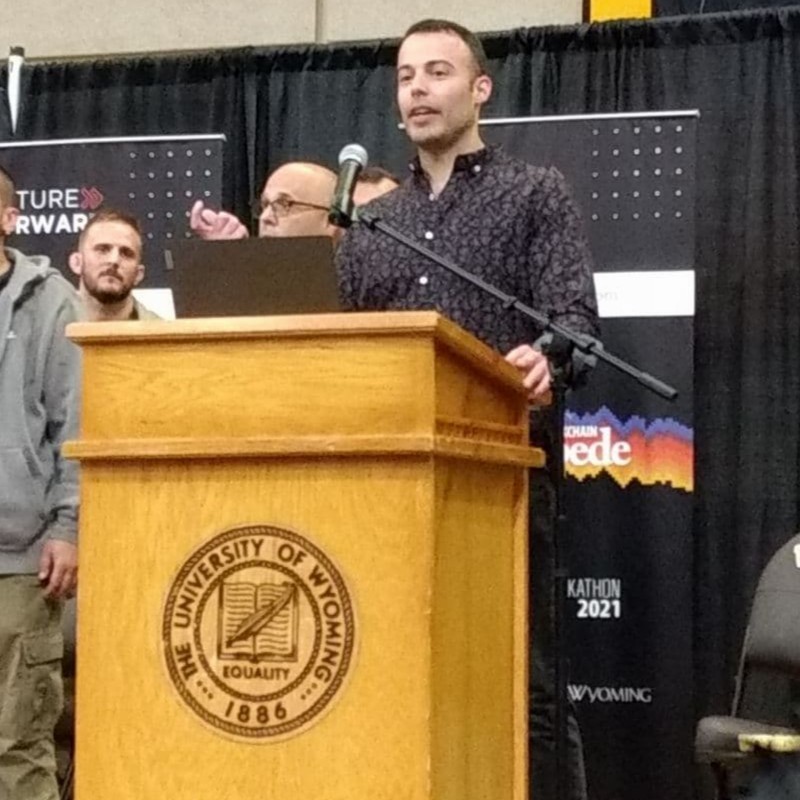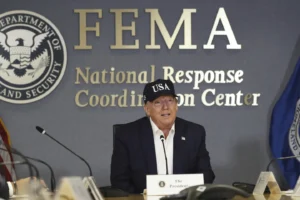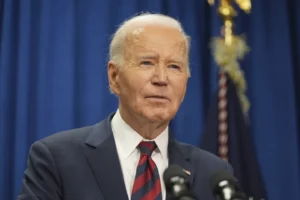State Selects Blockchain Entrepreneur from Cheyenne to Steer Its Stable Token
Commission tables conflict of interest policy, hears pitch for Ethereum
- Published In: Politics
- Last Updated: Sep 09, 2023

Members of the Wyoming Stable Token Commission (at right) listen to state Sen. Chris Rothfuss (D-Laramie, at left) during a Thursday meeting at the University of Wyoming. Rothfuss expressed concerns that a draft conflict of interest policy could limit experts’ participation in the development of the new token. (Courtesy image from the Governor’s Office via Zoom)
By CJ Baker
Special to the Wyoming Truth
This story has been updated to correct the description of a professional athlete investment token on September 25, 2023 as of 10:30 a.m. MT.
Although they launched a nationwide search, members of the Wyoming Stable Token Commission ultimately didn’t have to go very far to find their first executive director.
On Thursday, the commission chose Anthony Apollo of Cheyenne to help lead the state’s bid to create a digital representation of the dollar.
Apollo, who has experience in both finance and blockchain development, was selected among a “robust set” of over a dozen applicants, State Auditor and Commissioner Kristi Racines said. She and her fellow commissioners offered Apollo the job following a roughly two-hour interview behind closed doors. His hiring won’t be official until they agree on the exact terms; the position was listed at $150,000.
“I think we are all eager to move forward,” Racines said.

The Wyoming Truth was unable to immediately reach Apollo, but according to his LinkedIn bio and past statements, he started his career in finance, working at the professional services companies KPMG and EY in New York. He shifted to blockchain in 2017. In one job, he designed a token that allowed people to invest in NBA player Spencer Dinwiddie.
Most recently, Apollo launched Rensa, an Ethereum-based platform for developing and distributing games and other content; it’s designed to offer content creators a more efficient way to handle royalty payments and revenue sharing.
While much of the public discourse about blockchain and the crypto industry surrounds the wild price swings of coins and non-fungible tokens (NFTs), Apollo has stressed the utility of the underlying technology.
“For me, blockchain should be a fairly boring tool for a good long time,” he said in a June episode of the podcast Lights, Camera, Crypto. “It should be focused on creating massive efficiencies in cumbersome, … haphazard processes, and just relying on peer-to-peer payment tech to accomplish that …”
Wyoming’s planned stable token has itself been pitched as a way to facilitate faster, cheaper and more efficient financial transactions, effectively serving as a digital dollar that can be transmitted on a blockchain. There are already $123.7 billion worth of so-called stablecoins circulating onchain, but the state is hoping to be the first to launch one that’s fully trusted by the market.
Every Wyoming stable token would be backed by a dollar held in the real world, with token purchasers able to return them for $1 at any time. While the digital coins are in circulation, the state would take the cash and invest it in short-term treasury bills, pocketing the profits.
The revenue could be substantial — if interest rates remain high and the token catches on. Ethereum community member Ryan Berckmans contends the state could win 50% of the multi-billion market share now held by leaders Tether and USDC. With token holders’ rights enshrined in law instead of corporate policy, Berckmans said the state’s token could offer a “no brainer” property rights upgrade, potentially opening the door to billions of dollars in revenue for the state.
However, there are many hurdles the commission must clear before launch, including complying with numerous federal laws and regulators. On Thursday, commissioners voted to open negotiations with at least three law firms for specialized legal counsel.

Blockchain battle
Picking which blockchain(s) to use could also be challenging.
The commission’s draft business plan describes Ethereum as “a practical choice for stable token projects, especially those looking to enter the market quickly and efficiently.” However, Input Output — a Wyoming-incorporated company that developed the rival Cardano blockchain — disputes that Ethereum is the best choice.
In comments to the commission last month, J.J. Siler of Input Output said there were “serious issues” with the way Ethereum was developed, noting hackers have stolen billions of dollars from projects launched on the chain. Siler said Input Output would develop the state’s token for $1 to ensure it’s “developed correctly.”
But Berckmans, who traveled from his home in the Cayman Islands to Laramie for Thursday’s meeting, made a case for Ethereum.
While there have been many hacks of Ethereum-based applications, Berckmans said that’s because there are so many assets on the chain; at the time of the meeting, he said over $30 billion worth of value was secured on the network and the Layer 2 chains built on top of it. Further, the prior hacks and exploits have resulted in a “vast, hardened collection of open source applications and smart contracts,” he said, with developers spending hundreds of millions of dollars a year on security measures.
“There’s no more secure way, no cheaper way, and no faster way to launch a stablecoin than on Ethereum,” Berckmans said.
Chairman Gov. Mark Gordon noted that the commission has not made any decisions about what chains to use. Similarly, it hasn’t decided who will be able to use the token or in what ways.
Conflicts of interest

The commissioners have taken a cautious approach as they navigate uncharted waters. For instance, they debated at length over a proposed code of conduct for the blockchain experts who are volunteering their time on various stable token subcommittees. The primary goal, the commissioners indicated, is to avoid a situation where vendors could be accused of steering a contract to themselves.
However, state Sen. Chris Rothfuss (D-Laramie), who leads the Legislature’s blockchain committee, expressed concern that the draft policy could disqualify many experts from providing input on the token’s specifications, because they may want to later bid on developing the project.
There’s a limited pool of volunteers to draw from, Rothfuss indicated, and with a restrictive policy on conflicts, “I don’t know who is going to be left standing.”
But Racines called on the commission to move forward with a policy, saying there’s “a real risk” of problems if rules aren’t put in place.
“I’ll say this a little bluntly … but I’ve already seen [that] our public comment has become an opportunity for marketing and advertisements,” she said. “And so I do have concerns.”
The commission voted 5-2 to table the policy in hopes of finding a compromise that, as Commissioner David Pope put it, lays out expectations while still allowing access to experts.
When it launched the effort last winter, the Legislature required the commission to “endeavor” to issue the first Wyoming stable token by the end of the year. Gordon predicted that getting Apollo on board as the executive director will expedite the process.













